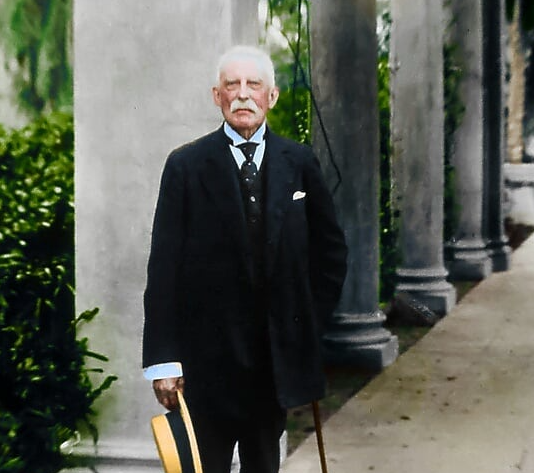Henry Flagler Biography – Henry Morrison Flagler, an American industrialist and a co-founder of Standard Oil, played an instrumental role in shaping the economic and cultural landscape of the United States. His visionary contributions extended beyond the world of oil as he transformed the Atlantic coast of Florida, founding cities, constructing railways, and leaving an indelible mark on the Sunshine State. In this comprehensive biography, we explore the life and achievements of Henry Flagler, a man whose influence reached far and wide.
Early Life and Education
Henry Flagler was born on January 2, 1830, in Hopewell, New York, into a family with humble beginnings. His father, Isaac Flagler, was a Presbyterian minister, while his mother, Elizabeth Caldwell Harkness Flagler, was a widow with two children from her previous marriage. Despite the modest circumstances of his upbringing, Flagler’s determination and work ethic were evident from a young age.
Flagler attended local schools up to the eighth grade. At the age of 14, he embarked on a journey to Ohio, joining his half-brother Daniel in various business ventures. His first job paid a meager $5 per month, but he quickly climbed the ranks and was promoted to the sales staff by the age of 19. Flagler’s early years were marked by hard work and perseverance, laying the foundation for his future success.
Business Ventures and Standard Oil
Flagler’s entrepreneurial spirit led him to explore different business opportunities. In 1862, he and his brother-in-law, Barney Hamlin York, founded the Flagler and York Salt Company in Saginaw, Michigan, which focused on salt mining and production. However, the Civil War and changing market dynamics led to the company’s downfall, causing Flagler significant financial losses. This setback taught him the importance of a thorough business investigation before investing.
Returning to Ohio in 1866, Flagler reentered the grain business, eventually forming a partnership with John D. Rockefeller. This partnership laid the foundation for the birth of the Standard Oil Corporation, which would become a dominant force in the oil industry. Flagler’s innovative idea of using rebates to strengthen the firm’s position against competitors and transport companies marked a turning point in the industry. By 1872, Standard Oil was the leading oil refining company in the United States, producing an impressive 10,000 barrels per day.
Flagler’s involvement in Standard Oil extended to moving the corporate headquarters to New York City in 1885, solidifying the company’s position in the heart of American commerce. However, as the company grew and faced legal challenges, including accusations of monopolising the oil trade, it became evident that Standard Oil’s dominance would not go unchallenged.
The Rise of Florida: Resort Hotels and Railroads
Flagler’s journey to Florida began as a quest for better health for his first wife, Mary. After her passing in 1881, Flagler married Ida Alice Shourds. Their honeymoon in St. Augustine, Florida, opened his eyes to the state’s potential. He saw the opportunity to transform Florida into a resort destination, and this vision became a driving force in his life.
In 1888, Flagler completed the opulent Ponce de Leon Hotel in St. Augustine. This venture marked the beginning of his quest to develop Florida’s East Coast. He expanded his holdings, building the Alcazar Hotel, the Hotel Ormond, and later, the Royal Poinciana Hotel in Palm Beach. His investment in infrastructure, including the Florida East Coast Railway, connected these resorts and paved the way for further development.
Flagler’s most ambitious project was extending the Florida East Coast Railway all the way to Key West. Completed in 1912, the railway featured the impressive Seven Mile Bridge and was regarded as an engineering marvel of its time. This achievement had a profound impact on the state, opening up new possibilities for trade and tourism.
Flagler’s Contributions and Legacy
Henry Flagler’s contributions to the development of Florida cannot be overstated. His investment in railways, hotels, and infrastructure transformed the state into a sought-after destination for tourists and settlers alike. He played a pivotal role in the growth of cities such as Miami, West Palm Beach, and Palm Beach.
Flagler’s philanthropic efforts included donations to hospitals, churches, and schools in Florida. He left a lasting legacy, earning him the title of “Father of Miami.” Flagler’s vision and determination turned a wilderness of waterless sand and underbrush into a thriving region, and his influence on Florida’s economic and cultural landscape endures to this day.
Controversies and Allegations
While Flagler’s contributions to Florida’s development are celebrated, it’s important to acknowledge the controversies associated with his business practices. Flagler allegedly used convict labour leased from Florida prison camps, primarily consisting of African Americans, in the construction of his projects. There were also reports of harsh working conditions and forced indebtedness among workers.
Flagler faced legal challenges related to these labour practices, but he and his company were never convicted. Some argue that muckrakers and reformers may have exaggerated the allegations. Nevertheless, these controversies serve as a reminder of the complex legacy of this influential industrialist.
The End of an Era
Henry Flagler’s life came to an end on May 20, 1913, following a fall down a flight of stairs at Whitehall, his Palm Beach residence. His passing marked the conclusion of an era characterised by immense industrial growth, visionary development, and transformative change.
Today, Henry Flagler’s legacy lives on in the cities, railways, and institutions he built in Florida. His impact on the state’s economy, tourism, and culture is undeniable. Flagler’s story serves as a testament to the power of vision, determination, and entrepreneurship in shaping the course of history.
In the words of George W. Perkins, “Flagler was a man of great vision, and he had the courage and the financial ability to carry his vision into execution. He dared to go where no man had ever gone before, and he paved the way for others to follow.”
